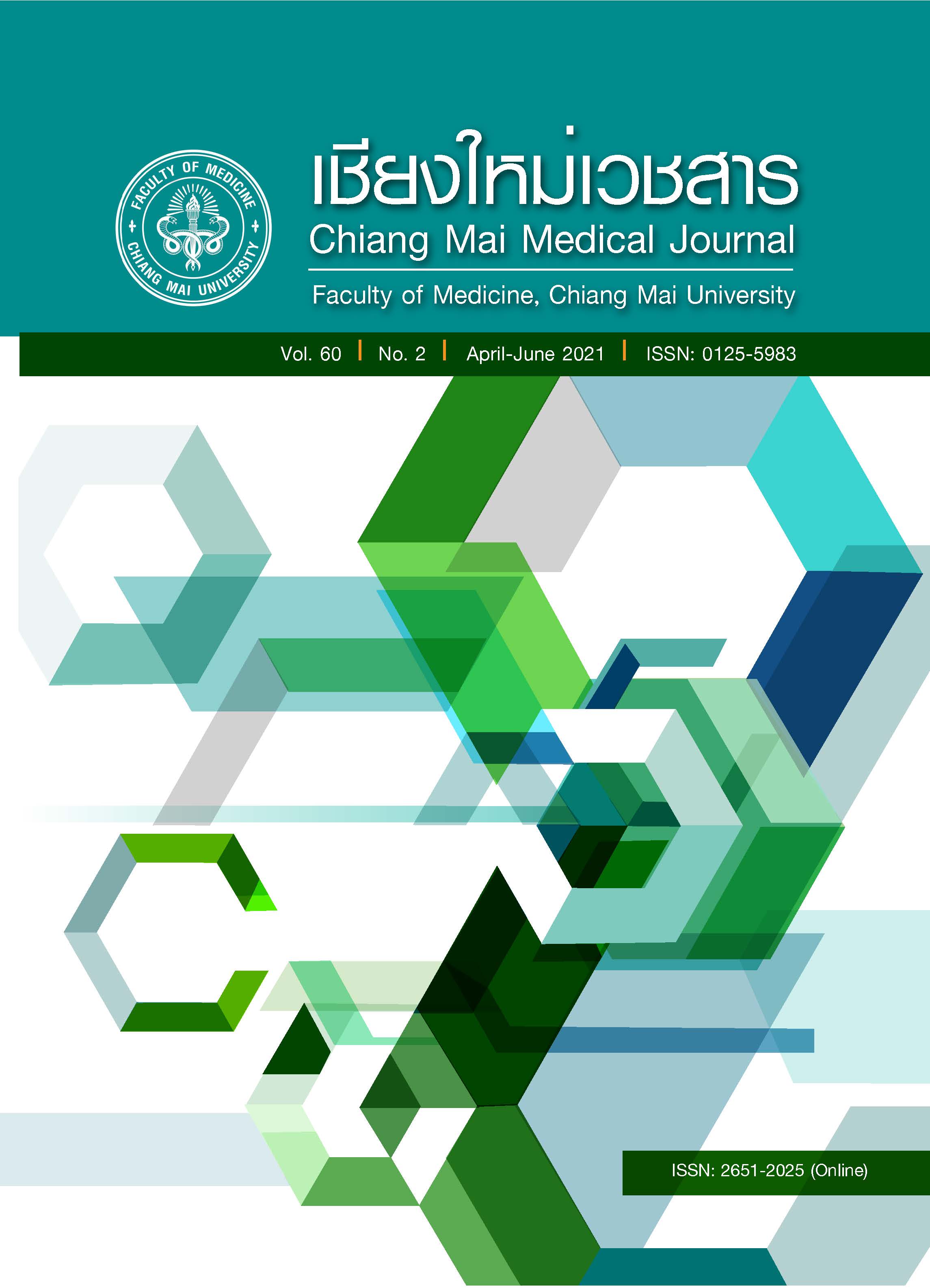Effects of different forms of communication on knowledge, attitudes and practices related to antibiotics smart use by undergraduate students in different faculties
Keywords:
antibiotics smart use, knowledge, attitudes, practices, communicationAbstract
Objectives To investigate correlations among different forms of communications and the knowledge, attitudes and practices of undergraduate students related to antibiotics smart use.
Methods Correlations of knowledges, attitudes, and practices regarding antibiotics and different forms of communications among third year students of three faculties, Associated Medical Sciences (AMS), Engineering (ENG) and Economics (ECON), were computed using a questionnaire and Spearman’s rank correlation coefficient analysis.
Results The highest correct knowledge and practices scores were exhibited by AMS students: 3.17 ± 1.12 (p < 0.001) and 4.08 ± 0.67 (p = 0.001), respectively. Gender, the only personal factor, was significantly correlated with negative attitudes and practices among Engineering and Economics students. Correct knowledge scores were significantly correlated with the method of communication. Only weak relationships were found with communication from medical practitioners among AMS and Engineering students, r = 0.278 (p = 0.004); and r = 0.295 (p < 0.001). Correlations were also weak for radio, television, and print media among the Engineering students, r = 0.287, (p = 0.003). A moderate relationship was found with communication from the internet in Engineering students, r=0.311 (p < 0.001), health posters or brochures, and family or close friends of the AMS students, r =0.329, (p = 0.001), and r = 0.305, (p = 0.001), respectively. Other correlations were not statistically significant.
Conclusion Antibiotics Smart Use (ASU) is an innovative model to promote the rational use of medicines, fight against the irrational use of antibiotics, and counteract antimicrobial resistance. The present study revealed that the information regarding antibiotics smart use provided via various forms of communications should be provided to improve the knowledge, attitude, and practice regarding antibiotics smart use among undergraduate students.
References
Goossens H. Antibiotic consumption and link to resis-tance. Clin Microbiol Infect. 2009;15:12–5.
World Health Organization. The world medicines situation. Geneva: WHO. [Internet] 2004. [cited 2018 Jun 18] Available from: https://apps.who.int/iris/bitstream/handle/10665/ 68735/WHO_EDM_PAR_2004.5.pdf
Suttajit S, Wagner AK, Tantipidoke R, Ross-Degnan D, Sitthi-amorn C. Patterns, appropriateness, and predictors of antimicrobial prescribing for adults with upper respiratory infections in urban slum communities of Bangkok. SE Asian J Trop Med. 2005;36:489–97.
Kim SS, Moon S, Kim EJ. Public knowledge and attitudes regarding antibiotic use in South Korea. J Korean Acad Nurs. 2011;41:742-9.
Eng VJ, Marcus R, Hadler JL, Imholf B, Vugia DJ, Cieslak P, et al. Consumer attitudes and use of antibiotics. Emerg Infect Dis. 2003;9:1128-35.
Sumpradit N, Chongtrakul P, Anuwong K, Pumtong S, Kongsomboon K, Butdeemee P, et al. Antibiotics smart use: a workable model for promoting the rational use of medicines in Thailand. Bull World Health Organ. 2012; 90:905-13.
Morgan DJ, Okeke IN, Laxminarayan R, Perencevich EN, Weisenberg S. Non-prescription antimicrobial use worldwide: a systematic review. Lancet Infect Dis. 2011;11:692-701.
Awad AI, Aboud EA. Knowledge, Attitude and Practice towards Antibiotic Use among the Public in Kuwait. PLoS One. 2015;10: e0117910.
Sirijoti K, Hongsranagon P, Havanond P, Pannoi W. Assessment of knowledge, attitudes and practices regarding antibiotic use in Trang province, Thailand. J Hlth Res. 2014;28:299-307.
Shehadeh M, Suaifan G, Darwish RM, Wazaify M, Zaru L, Aljafari S, et al. Knowledge, attitudes and behavior regarding antibiotics use and misuse among adults in the community of Jordan: a pilot study. Saudi Pharm J. 2012;20:125-33.
Aunruean W, Saensom D. Behavior of KKU students on antibiotics use in sore throat, clean wound and acute diarrhea. KKU ISR J. 2015;3(3):221-232. (in Thai)
Huang Y, Gu J, Zhang M, Ren Z, Yang W, et al. Know-ledge, attitude and practice of antibiotics: a questionnaire study among 2500 Chinese students. BMC Medical Education 2013;13:163.
Apisarnthanarak A, Tunpornchai J, Tanawitt K, Mundy LM. Nonjudicious dispensing of antibiotics by drug stores in Pratumthani, Thailand. Infect Control Hosp Epidemiol. 2008;29:572-5.
Sirirassamee B. Antibiotics use behavior of people in Nakornpathom province. Nakornpathom: Institute for Population and Social Research, Mahidol University. [Internet] 1997. [cited 2018 Jun 22] Available from: http://imsear.searo.who.int /handle/ 123456789/129280
Cespedes A, Larson E. Knowledge, attitudes, and practices regarding antibiotics use among Latinos in the United States: reviews and recommendations. Am J Infect Control. 2006;34:495-502.
You JHS, Yau B, Choi KC, Chau CTS, Huang QR, Lee SS. Public knowledge, attitudes and behavior on antibiotic use: a telephone survey in Hong Kong. Infection. 2008;36:153-7.
Belongia EA, Naimi TS, Gale CM, Besser RE. Antibiotic use and upper respiratory infections: a survey of knowledge, attitudes, and experience in Wisconsin and Minnesota. Prev Med. 2002;34:346-52.
Oh AL, Hassali MA, Al-Haddad MS, Sulaiman SAS, Shafie AA, Awaisu A. Public knowledge and attitudes towards antibiotic usage: a cross-sectional study among the general public in the state of Penang, Malaysia. J Infect Dev Ctries. 2011;5:338-47.
Downloads
Published
How to Cite
Issue
Section
License

This work is licensed under a Creative Commons Attribution-NonCommercial-NoDerivatives 4.0 International License.










